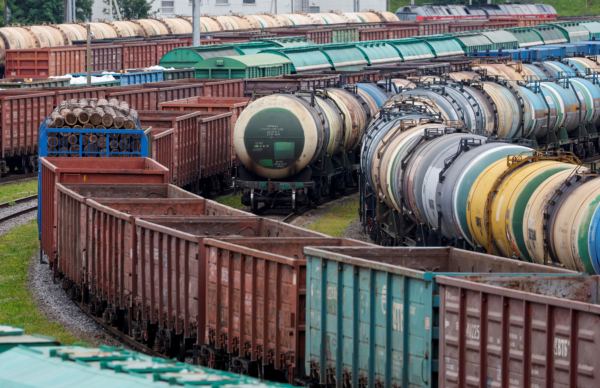 A view shows freight cars, following Lithuania's ban of the transit of goods under EU sanctions through the Russian exclave of Kaliningrad on the Baltic Sea, in Kaliningrad, Russia 21 June 2022.;
Credit: Vitaly Nevar / Reuters
A view shows freight cars, following Lithuania's ban of the transit of goods under EU sanctions through the Russian exclave of Kaliningrad on the Baltic Sea, in Kaliningrad, Russia 21 June 2022.;
Credit: Vitaly Nevar / Reuters
KYIV (Reuters) - Russia warned Lithuania on Tuesday 21 June 2022 that it would face measures of a "serious negative impact" for blocking some shipments by rail to Moscow's Baltic Sea enclave of Kaliningrad, in its latest dispute over Western sanctions imposed on the country for the war in Ukraine.
Russian forces and separatists in eastern Ukraine made further advances, pushing towards the city of Lysychansk, the Ukrainian forces' main bastion in an area that is part of the Donbas region Moscow claims for the separatists.
Ukraine continues to ask the West to send more artillery. Defence Minister Oleksiy Reznikov announced on Tuesday the arrival of powerful German self-propelled howitzers.
In retaliation for Western sanctions, Russia has begun pumping reduced volumes of gas to Europe via Ukraine. European Union (EU) states from the Baltic Sea in the north to the Adriatic in the south have outlined measures to cope with a supply crisis after Russia's invasion of Ukraine in late February put energy at the heart of an economic battle between Moscow and the West.
German Economy Minister Robert Habeck said the diminished flows amounted to an economic attack on Germany that "cannot be allowed to succeed".
Diplomatic attention has turned towards Kaliningrad, a Russian city situated between Poland and Lithuania with nearly a million residents. It is connected to the rest of Russia by a rail link through EU- and NATO-member Lithuania.
Lithuania has shut the route for transport of steel and other ferrous metals, which it says it is required to do under EU sanctions that took effect on Saturday. Lithuania is also blocking the transportation of food, jeopardising the region's food security, TASS news agency cited a foreign ministry spokeswoman as saying.
Lithuanians living just across the border said they have faith in NATO as a deterrent for any potential Russian attacks.
"Nothing bad will happen ... because Lithuania is in NATO and in the European Union," insurance worker Vitalijus Sidiskis, 59, said, while acknowledging it was difficult to predict what Russia might do.
Meanwhile, another Baltic country, Estonia, summoned the Russian ambassador on Tuesday to protest a violation of its national airspace by a Russian helicopter on 18 June 2022. There was no immediate Russian comment.
CONSEQUENCES
Nikolai Patrushev, secretary of Russia's Security Council, visited Kaliningrad to chair a security meeting there. He said Lithuania's actions showed that Russia could not trust the West, which he said had broken written agreements over Kaliningrad.
"Appropriate measures" were being worked out in response, Mr Patrushev was quoted as saying by state news agency RIA, and without elaborating said, "their consequences will have a serious negative impact on the population of Lithuania".
Moscow summoned EU envoy Markus Ederer to the Russian Foreign Ministry on Tuesday. EU spokesperson Peter Stano said Mr Ederer asked the Russians at the meeting "to refrain from escalatory steps and rhetoric".
The standoff creates a new source of confrontation on the Baltic, a region already set for a security overhaul that would hem in Russia's sea power as Sweden and Finland apply to join NATO and put nearly the entire coast in alliance territory.
The EU sought to deflect responsibility from Lithuania, saying the policy was collective action by the bloc.
In a symbolic decision, Ukraine is set to become an official candidate for European Union membership on Thursday, EU diplomats said.
United States (US) Attorney General Merrick Garland became the latest international dignitary to visit Ukraine, affirming on Tuesday Washington's commitment to identify, arrest and prosecute those involved in war crimes during Russia's invasion.
HEAVY FIGHTING
In some of the bloodiest fighting seen in Europe since World War Two, Russia has made slow progress in the Donbas since April in conflict that has cost thousands of soldiers' lives on both sides.
Some of the fighting has spanned the Siverskyi Donets river that curls through the Donbas, with Russian forces mainly on the east bank and Ukrainian forces mainly on the west.
But Ukrainian troops - and an estimated 500 civilians - are reportedly still holding out at a chemical plant in the east bank city of Sievierodonetsk, despite weeks of heavy bombardment.
The governor of Luhansk province, Serhiy Gaidai, confirmed that Toshkivka, a settlement on the west bank further south, was now controlled by Russian forces. This could boost Moscow's hopes of cutting off Lysychansk from Ukrainian-held territory.
Rodion Miroshnik, ambassador to Russia of the pro-Moscow self-styled Luhansk People's Republic, said forces were "moving from the south towards Lysychansk" with firefights erupting in a number of towns.
Separately, at least fifteen civilians were killed in Ukraine's Kharkiv region by Russian shelling, the regional governor said in an online posting.
Russia's defence ministry said its missiles had hit an airfield near the port of Odesa in response to a Ukrainian attack on gas production platforms in the Black Sea.
Reuters could not independently verify either report.








